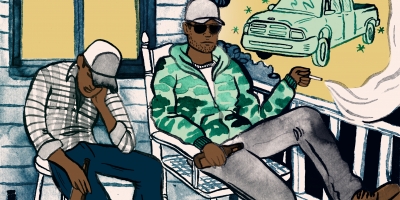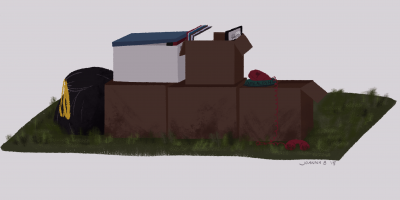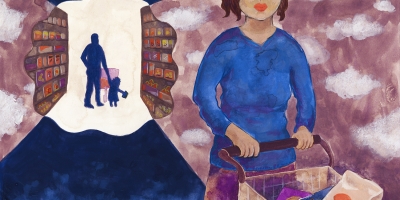Nonfiction
The Beating
by Jennifer Lewis

I’m lying on the operating table crucifix-style with leather straps binding my arms. The needle in my spine has erased my body. I am only a head.
“You won’t be able to feel your lungs,” my doctor says, “but you’re still breathing.”
Just then, something holds my breath. It feels as if I’m underwater. I can’t wait to blindly touch the wall, but there is no coming up. I’m suffocating. The beeping intensifies. An alarm goes off. My eyes flutter into the fluorescent lights.
“Is she okay?” my husband asks.
“Her vitals are fine,” my doctor replies.
I turn my head away from them and clench my face. I wonder if my body is sobbing, if my heart is beating.
“Can we untie one of her hands?” my doula begs. “So she can at least feel her breath?”
“I guess,” the doctor says.
Someone unbuckles my right hand. I watch my fingers wiggle. I cover my mouth and miraculously, I feel the tiniest hah on my palm. I’m breathing as if I’m fogging up a mirror. My hand is a piece of glass. Suddenly, my temperature drops. A freezing sensation envelops me as if they were putting me on ice. I hear a knocking sound that is louder than the beeping and buzzing. I listen to it as I hah, hah, hah into my hand.
“Is there anything you can do about her shaking?” my husband asks.
“The shaking is normal,” the doctor says.
I look at my husband, who is wearing scrubs but not a mask, and he looks incredibly young, too young to see his wife quivering on a table.
“Can we put a blanket under her elbow?” my doula suggests. “Her elbow is banging the table.”
The doctor’s face behind her mask is unfazed by my clamoring. She sighs. A nurse appears. Two folded sheets are placed under my arm. The beating stops, and strangely, I miss it.
“I’m going to make the incision now,” the doctor says.
She cuts through my tissues, slowly carving her way to my uterus. When she reaches my abdominal muscles, she separates them with her hands like my mother, who is waiting outside, used to unbraid my hair.
“We have the baby’s feet,” says the doctor. “You’re going to feel some pressure.”
I am so grateful to feel anything that I almost say, “Hurt me.” The doctor’s hands knead my stomach like dough. She rises on her toes as she flattens me out. I can only feel the pressure. When the pressing stops, the pulling begins. Deadlock. The doctor versus the strength that’s harboring inside of me. Its stubborn head stuck underneath my right rib. Its unwillingness to turn is why I’m being cut open. I don’t know how I know this or even if it’s true, but I know the doctor’s hands are around the baby’s ankles and I can feel her shimmying life out of my incision. The doctor takes one step back and pulls out something the size of the universe.
AAAAH, I breathe into my hand. I am an empty vessel.
The doctor lifts up this white mass of pulsing flesh, high above the blue sheet like a sacrifice, and asks my husband, not me, “Do you want to announce the sex?”
No one responds.
She repeats herself. She holds the baby that is not bloody but covered in toothpaste under the bright lights. Its white face tightens but doesn’t make a sound.
“It’s…it’s a…?” She angles its swollen genitals to my husband.
“Girl?” he says, and the doctor nods, yes. Color rushes to my husband’s face. I had only thought it was an expression, but he looks like he might actually jump with joy. I close my eyes. I know somewhere I am deeply happy, but I cannot feel exhilaration—yet. My heart is cold. Even colder than the ice bath my girlhood is drowning in. Tears fall from my eyes.
“Why is she white?” I ask in the thinnest voice. “Is she okay? She hasn’t cried. She isn’t moving.”
“It’s called vernix,” the doctor replies. “Babies that are early are still covered in it.”
Somebody wraps her up. They hold her white goo to my face. I turn my neck. She has huge purple lips. My husband’s lips. They hand her to him. His entire being grins into her barely opened eyes. The genetic blueprint passes, and it’s instant love for them. I perform a smile and watch my husband, whose abdomen is still intact, bleed with happiness, while I bleed somewhere behind the blue sheet. And instead of being moved, I think: I transformed, while you, you only watched.
A team of eager scrubs come in and takes her to a plastic case. Somebody tells me that they are checking her vitals. Her vitals are good. My husband follows them. Leaves me. Rolls the baby outside to my mother. My mother is waving and holding the baby. She will still be holding the baby when I’m rolled into post-op, waiting for my body to unthaw. But for now, I’m left with the women—the doula, two doctors, and a nurse.
“That was thirteen minutes,” my doctor says. “We have about thirty more.”
I remove my hand from my mouth and sink to the bottom. I watch my doctor as if she is working on someone else. Her movements are small and her eyes are intense but not unkind. She tells me she is removing my placenta. I hear something wet drop into a bucket, splashing. She rearranges my organs, cupping them with her hands, and glues me back together. The doula begins rubbing my scalp, pulling me out by my hair.
I am closed up.
My husband walks beside me as they wheel my bed into another room. My nose itches from the morphine the nurse has injected, but I can’t scratch yet. I still can’t lift my arms or wiggle my toes. I see my mother rocking the baby, who is wrapped in a footprint blanket. Someone has placed a tiny pink-and-blue-striped cap on her hairless head. I look down at my limbs as if the heat of my stare will melt the anesthesia away. It doesn’t. Someone could stick a knitting needle through my thigh and I wouldn’t even know.
My doctor swoops in. She lifts up my gown, removes the maxi pad that one of the nurses has placed on top of my wound to absorb my blood, and smiles at my incision. She’s pleased with her work.
“She’s the best,” the nurse says. “You’ll hardly scar.”
I narrow my eyes at the nurse and look at my doctor, who, two years from now, will remove her mask and kiss my cheek after she delivers my second daughter, vaginally. Two years after that, she will save my son, who will be born with the umbilical cord so tightly around his neck that his face is blue and bruised like a boxer. But at this moment, she asks, “Would you like to have him circumcised?”
I look at her so intensely that she catches her mistake. “I’m sorry,” she says, “that was my fourth C-section today.” She places my folder in the pocket on the door and walks away down the hall.
A lifetime later, my lungs start to take shape. I flutter kick my feet. Roll my ankles. Bend my knees. I flip my palms to the ceiling and make a fist. I bring my hands to my shoulders like I’m lifting an imaginary barbell. I open my jaw, one last hah.
“I’m ready,” I say to my mom and my husband.
My mother hands me Grace, and I look at my daughter as if it’s the first time.




